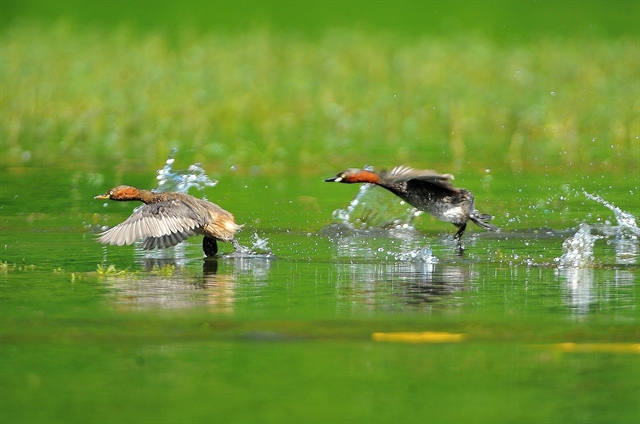 Environment
Environment

Việt Nam’s ecosystems are in a strong decline and are threatened with losing their basic functions, experts said at a two-day conference that ended on Thursday in Hà Nội.

|
| Teals, scientific name is Anas crecca, are in the Tràng An tourism site in the northern province of Ninh Bình. — VNA/VNS Photo Minh Đức |
HÀ NỘI — Việt Nam’s ecosystems are in a strong decline and are threatened with losing their basic functions, experts said at a two-day conference that ended on Thursday in Hà Nội.
The 'Tentative agenda for national dialogue and consultation workshop on draft national ecosystem assessment report' event was held by the Institute of Strategy and Policy on Natural Resources and Environment (ISPONRE) under the Ministry of Natural Resources and Environment and its partners.
The report is a part of the 'Support to developing capacities to address science-policy-practice interface project' which has been conducted in eight countries including Azerbaijan, Bosnia and Herzegovina, Cambodia, Cameroon, Colombia, Ethiopia, Grenada and Việt Nam with financial support from the International Climate Initiative of the German Federal Ministry for the Environment, Nature Conservation and Nuclear Safety.
The project runs from April 2017 to December next year.
The report aims to supply a database for policymakers by connecting science-policy-reality. It urges inserting biological diversity into policy compiling.
At the conference, nearly 100 experts exchanged data, information and approaches to complete the report.
Associate professor Nguyễn Thế Chinh, director of the ISPONRE, said researching the ecosystem was important work.
It helped supervise impacts on the environment during the process of agricultural, industrial, tourism and services development, he said.
Việt Nam has joined many international commitments about biological diversity.
The country wants to learn from other nations about setting policies related to biological diversity maintenance, so it needs more research and to use new approaches to reach targets in the national strategy on biological diversity in 2011-20, according to Chinh.
“Biological diversity and ecosystem services should be inserted into national plans and strategies,” said Chinh.
Huỳnh Thị Mai, national ecosystem assessment project co-ordinator, said one of the main discoveries of the project’s researchers was that national forest area decreased from 12 million hectares in 1945 to 2.8 million hectares in 2017.
The amount of coral also gradually decreased, with more than 63 per cent in bad condition.
This was caused by uncontrollable fishing, with illegal fishing harming the coral system.
Coral exploitation for tourism also threatens the system.
Experts at the conference said it was necessary to have a management system on biological diversity with detailed duties for each organisations at each level. — VNS




